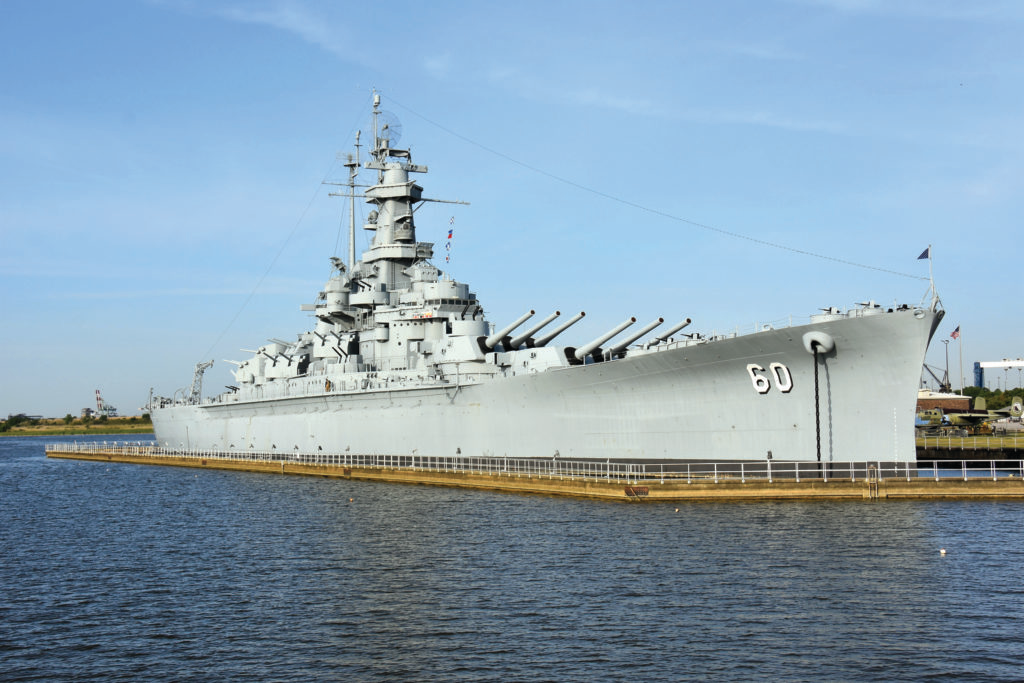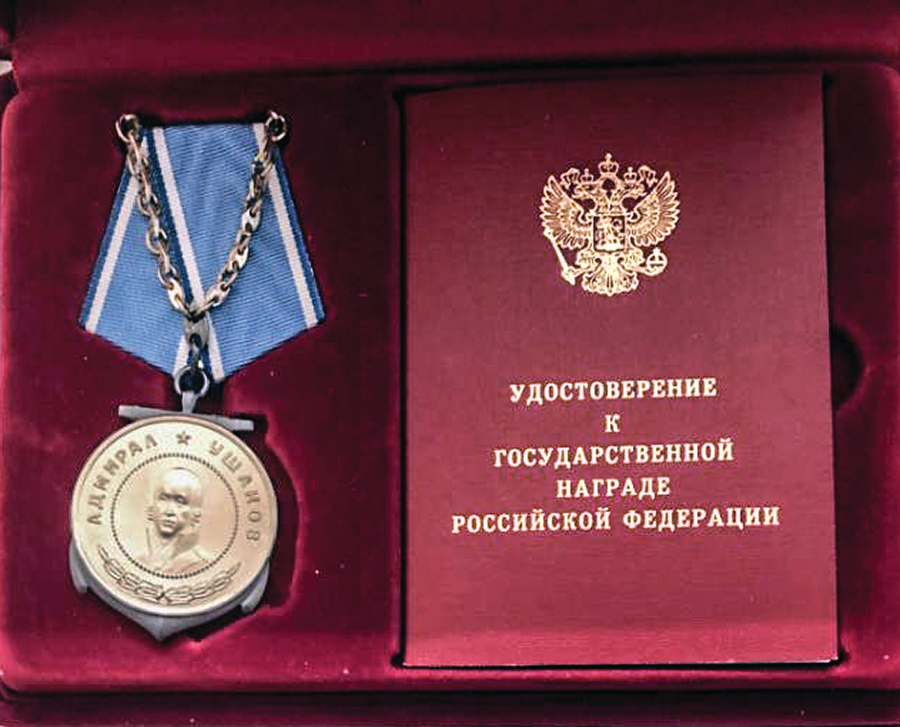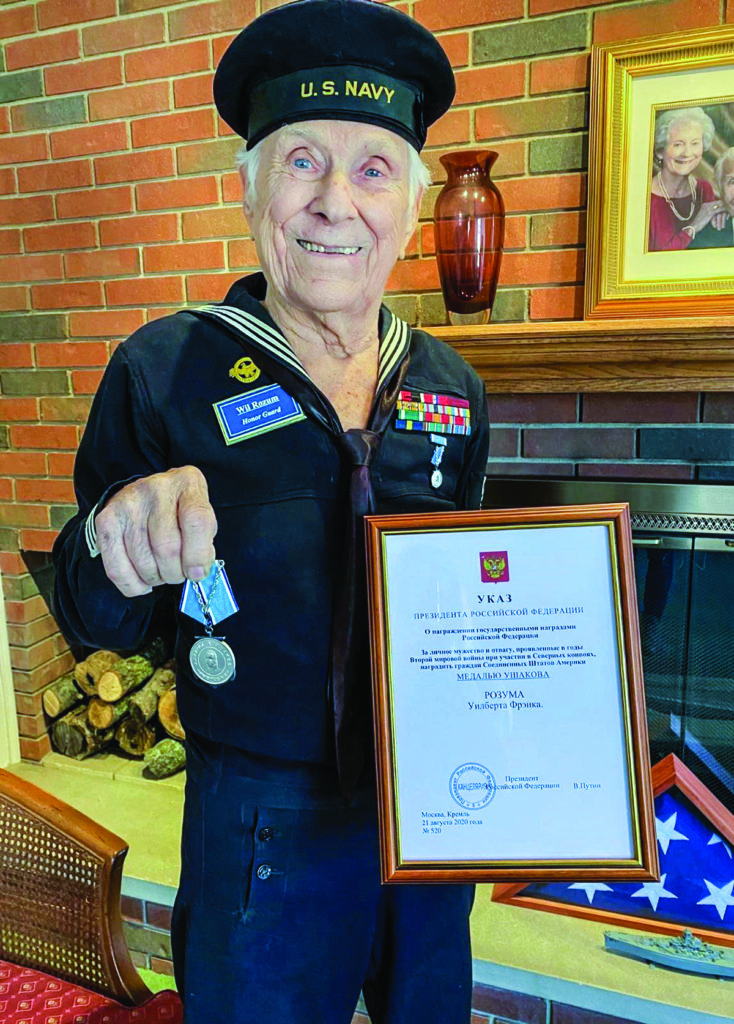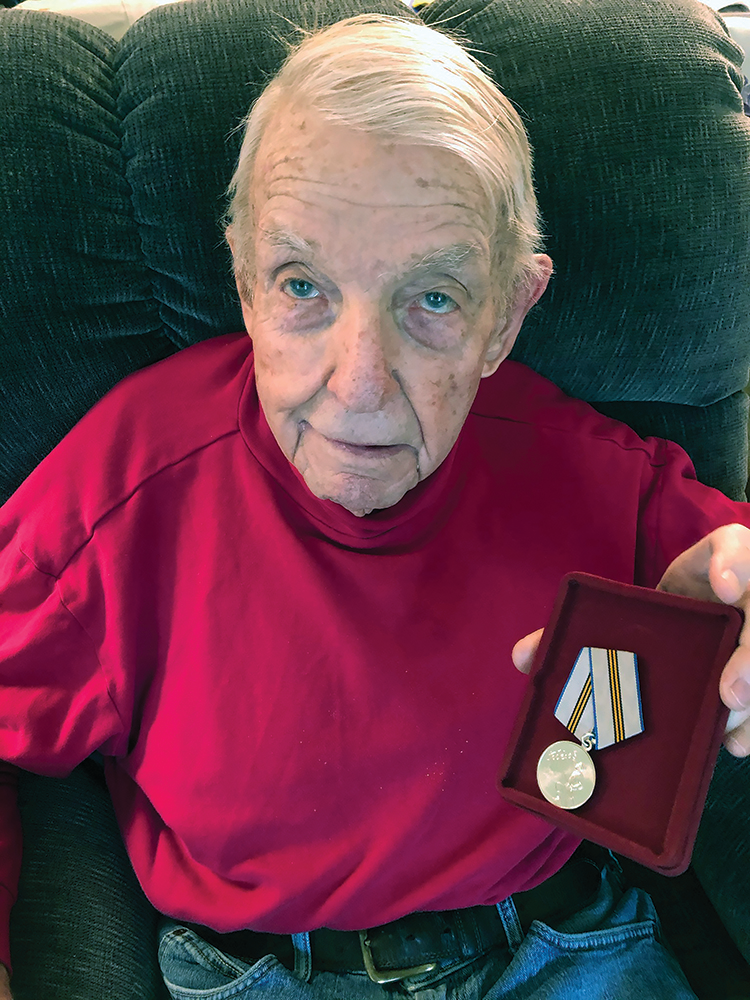USS Alabama sailors honored by Russia for WWII service

By Emmett Burnett
There was a time when Russia and America’s military were comrades-in-arms. The time was World War II and one example is the Battleship USS Alabama (BB-60). Recently, Moscow said “thank you for helping” to five of the sailors of the “Mighty A,” who 75 years ago never dreamed they would be awarded medals with the Kremlin’s blessing.
The five are William Hahn, Wilbert Rozum, Raymond E. Weigand Jr., Wallace L. Orsund, and Leo J. Goulet. Sadly, Goulet died shortly before receiving the award, the Medal of Ushakov.
Named for a Russian naval war hero, Admiral Fyodor Ushakov, Russia uses the honor to recognize soldiers and sailors who assisted the Soviets in World War II, regardless of nationality. However, qualifications for the prize are significant.
One: The recipient must be living. Two: The person must have actually participated in the Arctic Northern Convoys. About 7,000 men staffed the USS Alabama; not all served when the vessel assisted the Soviets.
The five Americans – now four after Goulet’s death – are the only known living of the ship’s crew who participated.

“Back in 1943, these young crewmen went to the North Sea to give protection to ships supplying our ally, Russia,” says Bill Tunnell, chairman of the USS Alabama Battleship Commission. “It surprises many today, learning the United States and Russia fought on the same side during World War II. Quite possibly, the American fleet’s protection of those supply ships may have saved Russia and kept her in the war, eventually allowing the Allies to defeat Germany and the Axis powers.”
Baltimore native William Hahn was one of the five. “Never did I expect recognition from the Soviet Union,” the now 98-year-old chuckles. Hahn modestly adds, “I was just a gunner,” as if “just a gunner” was a day at the beach. It was not.
He recalls a night when chilling news blared aboard the USS Alabama’s speakers. “The captain told us tomorrow we will be off the coast of Norway and expect an air attack. I manned an anti-aircraft gun, which meant I would be a key target.” Hahn added, “I thought to myself, this could be my last night on earth.”
Wilbert Rozum was just 20 when first boarding the USS Alabama. Today he is 99. “I was very excited to receive the Ushakov,” the Highland, Illinois, resident recalls. His medal hangs by his fireplace beside his World War II Navy uniform, which still fits. “I feel good about what we did.” He remembers, “It was a touchy situation. We worried about Germans attacking, stealing our supplies, and shooting us.”
Rozum and Hahn both noted that British vessels also helped but were not enough. If the German battleship Tirpitz – sister ship of the Bismarck – attacked, Russia would need help. The USS Alabama was dispatched.

Fast-forward to 2021.
Russia says ‘thank you’
The Ushakov-USS Alabama quest began in August 2019 when the ship’s curator, Shea McLean, read a story about British sailors receiving Russian medals. “Now that’s something you don’t see every day,” McLean thought, and pursued further. The British received the Ushakov for service at the Arctic Circle. McLean thought, “Our guys were in that convoy too! Where are their medals?”
A two-year process of documentation, applications, and statistics finally yielded results. On Aug. 24, 2020, the verdict was in. Marina Lyukmanova, first secretary of the Russian Federation in the U.S., informed Todd Kreamer, USS Alabama historian, “We have good news for you.”
Hahn had applied for the medal years earlier and already received it; the additional four crew members were accepted for the Ushakov.
The Russian government thanked the USS Alabama’s research team for devotion and diligence in adding the five American sailors to Ushakov’s honor roll. They also thanked the ship’s crewmen no longer living who participated in the World War II Soviet escort.

Bill Tunnell notes, “Although the Russian government changed dramatically in the past 75 years, I’m very proud the current Russian government chose this wonderful act of international goodwill to honor and remember those USS Alabama sailors who helped then during this crucial time in world history.”
USS Alabama Battleship Memorial Park director, retired Army Reserve Maj. Gen. Janet L. Cobb, echoes Tunnell’s sentiments: “This award reflects one of the untold stories about the USS Alabama’s North Atlantic campaign. How wonderful that this recognition comes in time to honor our living crewmen!”
Last year, in recognition of the 75th anniversary of ending the Great Patriotic War – also known as World War II – Moscow’s Cathedral of the Russian Armed Forces opened a special exhibit, titled “Road of Memory.” Displays included photographs and stories of veterans who served. Among those in the museum are Hahn, Rozum, Weigand, Orsund, and Goulet.
On the other side of world, the USS Alabama is forever moored in Mobile and is one of the top tourist destinations in the state. The five men represent many sailors on that ship who assisted a grateful nation a world away.




